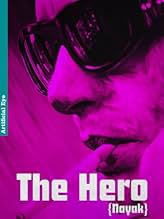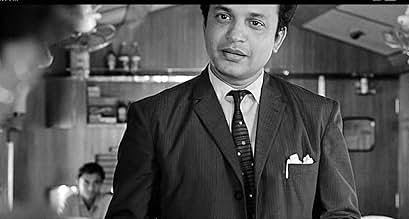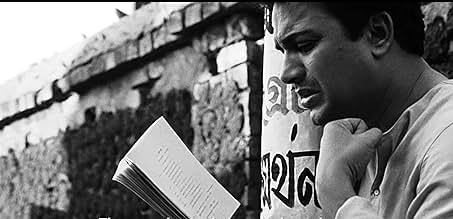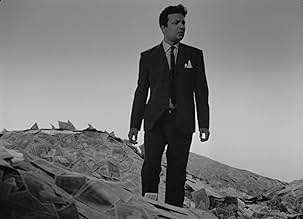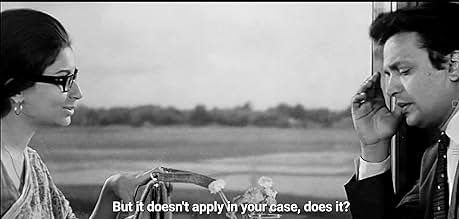IMDb-BEWERTUNG
8,3/10
5651
IHRE BEWERTUNG
Füge eine Handlung in deiner Sprache hinzuEn route to Delhi to receive an award, a Bengali film star reevaluates his success through his fellow passengers, dreams, and past experiences.En route to Delhi to receive an award, a Bengali film star reevaluates his success through his fellow passengers, dreams, and past experiences.En route to Delhi to receive an award, a Bengali film star reevaluates his success through his fellow passengers, dreams, and past experiences.
- Auszeichnungen
- 8 Gewinne & 1 Nominierung insgesamt
Kamu Mukherjee
- Pritish Sarkar
- (as Kamu Mukhopadhyay)
Susmita Mukherjee
- Molly (Mr. Sarkar's wife)
- (as Susmita Mukhopadhyay)
Subrata Sensharma
- Ajoy
- (as Subrata Sen)
Jogesh Chatterjee
- Aghore, elderly journalist
- (as Jogesh Chattopadhyay)
Satya Banerjee
- Swamiji
- (as Satya Bandyopadhyay)
Empfohlene Bewertungen
This film from director Satyajit Ray reminded me a little bit of Ingmar Bergman's 'Wild Strawberries', as in each case a protagonist takes a trip in order to receive a big award, and thinks back on his life with some regrets. In this case, it's not an elderly professor, it's a middle-aged movie star (Uttam Kumar), and instead of a car ride with a daughter-in-law, it's a train trip where he meets a young journalist (Sharmila Tagore). She serves as his conscience and mirror over a series of discussions the pair have, and what she reflects is often not very pretty.
At the film's outset the famous star seems to have it all with his success and good looks, and Kumar looks pretty damn cool in shades and when he blows smoke rings. It's soon apparent that he's so worried about someday losing his fame that he's lost bits of his humanity along the way. Via flashbacks we find that he's done some petty things to others, abandoned the altruistic cause of a friend, and taken advantage of women who want to get into films. There is something empty and pathetic about his life that those who get to know him see, including the journalist and a mother and daughter in his compartment who are adoring fans, but see how he pops sleeping pills and gets plastered. And yet, he's always cast as a hero (a 'nayak'), and to the legions of fans who crowd around him in the train stations, he is one.
The meaning of that is pretty clear, but it's not as simple as just showing us how someone on a pedestal may be unworthy of being there. More generally, the film shows us how the most outwardly successful people may be damaged or flawed within, and carry a lot of insecurity. It does this in a thoughtful and reflective way, avoiding simple black/white characterizations. Ray adds depth to the story with a subplot in which a salesman wants his wife to be friendly to another man in order to help win him over. It adds to the overall question, to what lengths should one go in order to be (financially) successful? And regardless of whether one can stay on top, he reminds us via a powerful dream sequence featuring skeletal arms poking up out of mounds of cash, that death will come for us all.
The performances are all fantastic, including an old curmudgeon who eschews "modern movies", and Tagore, who is intelligent, sassy in a reserved way, and beautiful too. I liked how Ray didn't have her succumb to the movie star's charms, as a weaker director/writer might have done. He also uses the train very well, both in moving the action around its various compartments and aisles, and in giving us the scenery outside. In one moment Kumar stares down at the adjacent rail track streaming by with a glint of light on it, and it made me wonder if he was wishing he could be like that rail, staying straight as the train of life rumbled along, and always in the light. The film also made me wonder if the main character reflected a little of Ray himself, who by this time was famous (ala Fellini's 8 ½). It's a film that I might rate higher with a second viewing, and may have held back a little here because I have a slight aversion to stories involving the problems of famous people. It was memorable and had a strong ending.
At the film's outset the famous star seems to have it all with his success and good looks, and Kumar looks pretty damn cool in shades and when he blows smoke rings. It's soon apparent that he's so worried about someday losing his fame that he's lost bits of his humanity along the way. Via flashbacks we find that he's done some petty things to others, abandoned the altruistic cause of a friend, and taken advantage of women who want to get into films. There is something empty and pathetic about his life that those who get to know him see, including the journalist and a mother and daughter in his compartment who are adoring fans, but see how he pops sleeping pills and gets plastered. And yet, he's always cast as a hero (a 'nayak'), and to the legions of fans who crowd around him in the train stations, he is one.
The meaning of that is pretty clear, but it's not as simple as just showing us how someone on a pedestal may be unworthy of being there. More generally, the film shows us how the most outwardly successful people may be damaged or flawed within, and carry a lot of insecurity. It does this in a thoughtful and reflective way, avoiding simple black/white characterizations. Ray adds depth to the story with a subplot in which a salesman wants his wife to be friendly to another man in order to help win him over. It adds to the overall question, to what lengths should one go in order to be (financially) successful? And regardless of whether one can stay on top, he reminds us via a powerful dream sequence featuring skeletal arms poking up out of mounds of cash, that death will come for us all.
The performances are all fantastic, including an old curmudgeon who eschews "modern movies", and Tagore, who is intelligent, sassy in a reserved way, and beautiful too. I liked how Ray didn't have her succumb to the movie star's charms, as a weaker director/writer might have done. He also uses the train very well, both in moving the action around its various compartments and aisles, and in giving us the scenery outside. In one moment Kumar stares down at the adjacent rail track streaming by with a glint of light on it, and it made me wonder if he was wishing he could be like that rail, staying straight as the train of life rumbled along, and always in the light. The film also made me wonder if the main character reflected a little of Ray himself, who by this time was famous (ala Fellini's 8 ½). It's a film that I might rate higher with a second viewing, and may have held back a little here because I have a slight aversion to stories involving the problems of famous people. It was memorable and had a strong ending.
10sbaindia
A movie at par with Citizen Kane and Rashomon and IMO even better than them in some ways. Impeccable direction and superb acting. Makes you wonder why these two - the actor and director not get together more often in Satyajit Roy films. The angst was so real it seems the guy is not acting any more - just telling his story as it is. The dream sequencewas outstanding as was the ending. The characterisation had on occasion skirted around the burlesque with the older actor in his first interaction with the protagonist but that made the scene all the more poignant. The underlying philosophy is not too deep but something that one can deeply empathise with. The greatness of this movie is how perfectly the story is told. There is an aura of dramatic tension throughout, not between the characters but within the protagonist himself. I would sincerely recommend this movie to anyone who loves what cinema is all about.
Though Uttamkumar is not the favorite of the class audience as opposed to Saumitra Chatterjee, the favorite of Satyajit Ray himself, this movie is one of the two occassions where Uttam and Satyajit came together and the outcome is a masterpiece. To me, this is the best creation of Ray. Satyajit rightly chose one and only Uttam as the 'Nayak'.Undoubtedly, Uttam,whose movies are intimately woven to every bengali's life even after 24 years of his death, is the alltime silver screen idol of all generations of Bengali film lovers. Though Uttam didn't get the much blessings of the classy directors compared to his arch rival Soumitra, this is one of the few occassions where Uttam got the chance to prove his acting skill and explioted to the fullest extent.
The story starts when there are two news regarding Arindam, played by uttam, published in the news papers - one is the fighting in a night club and the other that he has been nominated for a prestigeus award. In a train journey to delhi, he reveals himself to a lady reporter played by Sharmila. It was a self digging in a form of informal interview. The movie shows the public life and the personal life of a celebrity and all within the time span of a train journey and the flashbacks.
Finally, whoever likes good movie and haven't seen it already, its should be a must-see one.
The story starts when there are two news regarding Arindam, played by uttam, published in the news papers - one is the fighting in a night club and the other that he has been nominated for a prestigeus award. In a train journey to delhi, he reveals himself to a lady reporter played by Sharmila. It was a self digging in a form of informal interview. The movie shows the public life and the personal life of a celebrity and all within the time span of a train journey and the flashbacks.
Finally, whoever likes good movie and haven't seen it already, its should be a must-see one.
I have never seen an Indian movie quite like Nayak. Ray has forayed into parallel story telling, like Kurasawa's Rashomon and into dream logic like Bunuel's The Discreet Charm of the Bourgeoisie. I would personally rate it above Bergman's The Magician which also dealt with a similar theme of an actor's reality and people's acceptance of him as a super human and their reluctance of considering him as a human being. Between the two of them, Nayak is more easy to understand whereas The Magician puts its characters in various shades of good and evil throughout its running time.
No such dramatics here and this movie is as good as it gets. I would rate it as one of his best movies amongst Pather Panchali and Charulata. The dream sequences were very well produced and were relevant to the storyline on a sub-conscious level.
The subtitling on the Angel DVD wasn't very well done and the dialogues sometimes whizz by without us being able to read them in time. For people who are familiar with Indian languages, it may not be such a big deal since several of the Bengali words can be understood by them; however for non-Indian speakers this may come across as irritating.
On a personal note, I am sometimes glad that not many people know about Ray because then I am able of recommending him to people who are in the know of the movie industry.
No such dramatics here and this movie is as good as it gets. I would rate it as one of his best movies amongst Pather Panchali and Charulata. The dream sequences were very well produced and were relevant to the storyline on a sub-conscious level.
The subtitling on the Angel DVD wasn't very well done and the dialogues sometimes whizz by without us being able to read them in time. For people who are familiar with Indian languages, it may not be such a big deal since several of the Bengali words can be understood by them; however for non-Indian speakers this may come across as irritating.
On a personal note, I am sometimes glad that not many people know about Ray because then I am able of recommending him to people who are in the know of the movie industry.
The complete experience can be summarized as "another master piece from a true master film director Satyajit Ray". It always remains a unique experience to watch in someone's past and especially into the hidden past. The movie tackles the very issue in the most effective of the ways. To carve you characters in the story is the most important part and great directors always take their time to do so and here Ray did it in style. He gives a very appropriate introduction to each. But what needs to be praised is
in doing so story did not come to halt
it keeps on moving and things become more clear with every passing movement.
The acting is very good. I know only actor in the movie before watching it and that is of Shermila Tagore (because of her Hindi films). But really admires the acting of the main role played by Uttam Kumar. He is very natural, fluent and expressions complement his words in every scene. Especially the acting is priceless to watch in the scene in which he is telling Aditi about his insult by the one of his senior. A must watch for all those who appreciate good excellent cinema.
8/10
The acting is very good. I know only actor in the movie before watching it and that is of Shermila Tagore (because of her Hindi films). But really admires the acting of the main role played by Uttam Kumar. He is very natural, fluent and expressions complement his words in every scene. Especially the acting is priceless to watch in the scene in which he is telling Aditi about his insult by the one of his senior. A must watch for all those who appreciate good excellent cinema.
8/10
Wusstest du schon
- WissenswertesDirector Satyajit Ray had written the script of this movie considering only Uttam Kumar in the lead role. He had confessed that if Uttam Kumar had refused it, he would've abandoned the project altogether.
- Zitate
Arindam Mukherjee: There's no scope of overacting in front of camera; if you overact a little, then it will magnify tenfold in the camera.
- VerbindungenReferenced in Autograph (2010)
Top-Auswahl
Melde dich zum Bewerten an und greife auf die Watchlist für personalisierte Empfehlungen zu.
- How long is The Hero?Powered by Alexa
Details
- Laufzeit1 Stunde 57 Minuten
- Farbe
- Sound-Mix
- Seitenverhältnis
- 1.37 : 1
Zu dieser Seite beitragen
Bearbeitung vorschlagen oder fehlenden Inhalt hinzufügen


